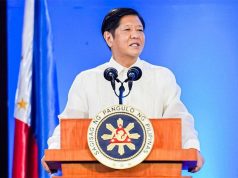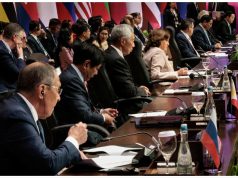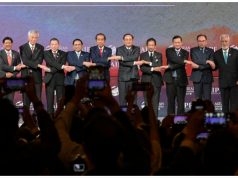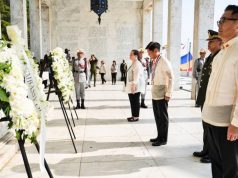MANILA – (UPDATE, 5:31 P.M.) What deal? The Marcos family on Tuesday said it had nothing to do whatsoever with a reported proposal, pitched by Marcos loyalist Oliver Lozano, offering to share with the Philippine government a fraction of the vaunted wealth of the late dictator’s family in exchange for dropping all cases against them.
A statement issued to media through lawyer Vic Rodriguez had former senator Ferdinand “Bongbong” Marcos Jr. saying: “Let me respond by saying in a very clear manner that the Marcos family has no knowledge or information of that apparent exchange and service of document between Lozano and the office of Sec. Sal,” a reference to Presidential Legal Counsel Atty. Salvador Panelo.
Panelo earlier acknowledged having been sent a copy of the proposal crafted by Atty. Oliver Lozano, a known loyalist of the dictator, but did not comment.
“As a point of information, Oliver Lozano does not represent any member of the Marcos family or the estate of the late President Marcos,” said Bongbong Marcos’s statement.
The former senator and only son of the late dictator, who declared martial law in 1972 and went on to impose one-man rule — arrogating unto himself the task of legislation until his ouster in the 1986 EDSA People Power revolt — had in the past been nettled by allegations their family was trying to sneak in deals with the government to finally get rid of cases filed to recover alleged ill-gotten wealth.
In October 2016, an irritated Bongbong Marcos said the government is free to grab the family’s alleged ill-gotten wealth should it find such.
LOZANO CONFIRMS HE CRAFTED DEAL, HITS ATTY. RODRIGUEZ
Lozano confirmed that he was the one who sent the draft compromise agreement to Malacañang and the Department of Justice, but clarified that it did not bear any provision for granting immunity to the Marcoses.
Neither did he suggest dropping all cases in connection with the Marcos wealth, added Lozano.
What he pitched in the compromise agreement, said Lozano, is due process and a speedy trial in the Marcos cases.
Lozano explained he was purely motivated by a desire to put closure to the issue.
He added this is part of the “legacy” that the late dictator Ferdinand Marcos sought in a document.
The supposed legacy includes giving away his wealth to the Filipino people.
Lozano said he believes the Marcos wealth is big enough to pay for the entire debt of the Philippines, and bring the nation out of poverty.
Part of what is tagged as Marcos wealth are the alleged ill-gotten and sequestered Marcos wealth cases still pending in courts, the so-called Yamashita treasures and assets stored up by Marcos when he was still a lawyer, before entering national office.
The compromise agreement drafted by Lozano excludes assets that have already been confiscated or are already covered by a court decision, such as part of the Imelda jewelry collection.
Lozano said he could not give an exact estimate of how much wealth is involved here, because the government has to make a full inventory.
Lozano lashed out, meanwhile, at former senator Bongbong Marcos’s lawyer Vic Rodriguez for issuing the statement that Lozano does not represent the Marcos family. Lozano called Rodriguez “gago”.
Lozano said he crafted the draft agreement as a way of helping resolve an important issue that has hounded the nation for decades.
He insisted he had the blessings of the Marcos family to craft the compromise agreement and send it.
Lozano, meanwhile, also attacked social media personality Gang Badoy, who shared a copy of the draft compromise agreement, saying he suspected she has a motive to stop the compromise deal.
He noted that Badoy is active in the anti-Marcos group Never Again Movement.
ESTIMATE: $5B TO $10B
An oft-quoted estimate of the alleged ill-gotten wealth amassed by Ferdinand Sr. since being elected president in 1965 is anywhere from $5 billion to $10 billion.
The Presidential Commission on Good Government (PCGG), created through the first executive order by the then President Corazon Aquino in 1986 has often been criticized for the slow pace of recovery. It reported, however, having gotten back over ₱170 billion as of end-2015.
Part of the proceeds of wealth seized by the government has gone to fund compensation by the State to thousands of victims of human rights violations during Marcos’ martial law, in a process supervised by a board created by legislation.









